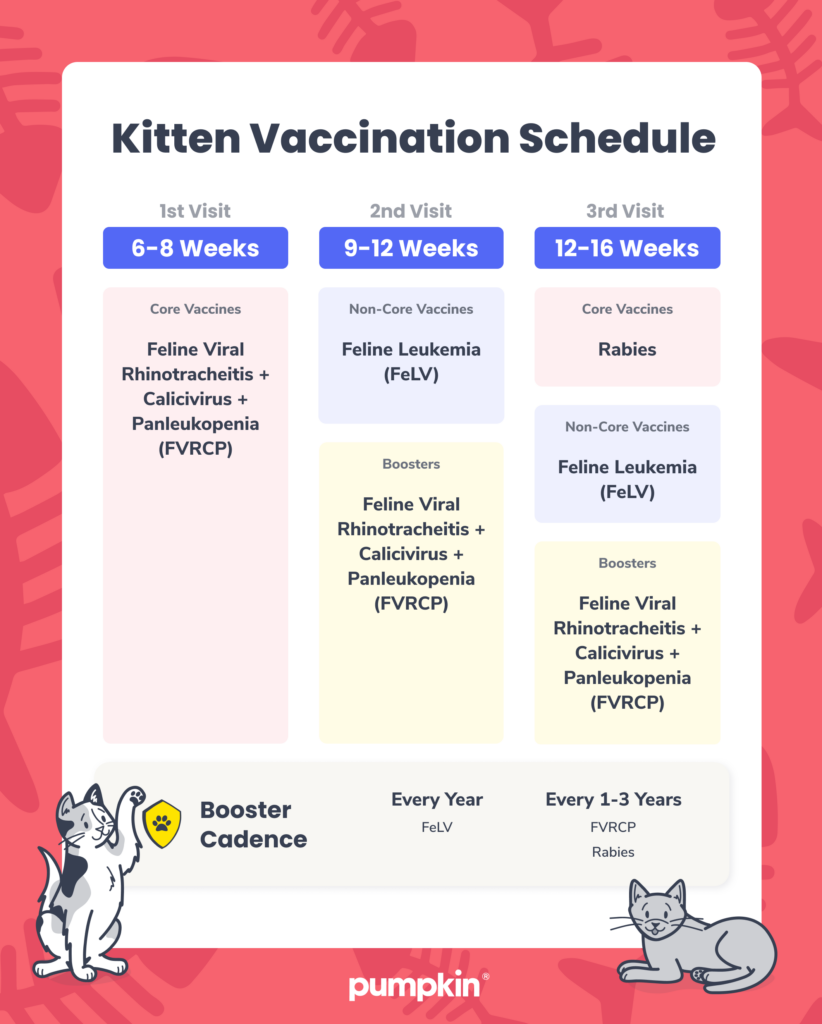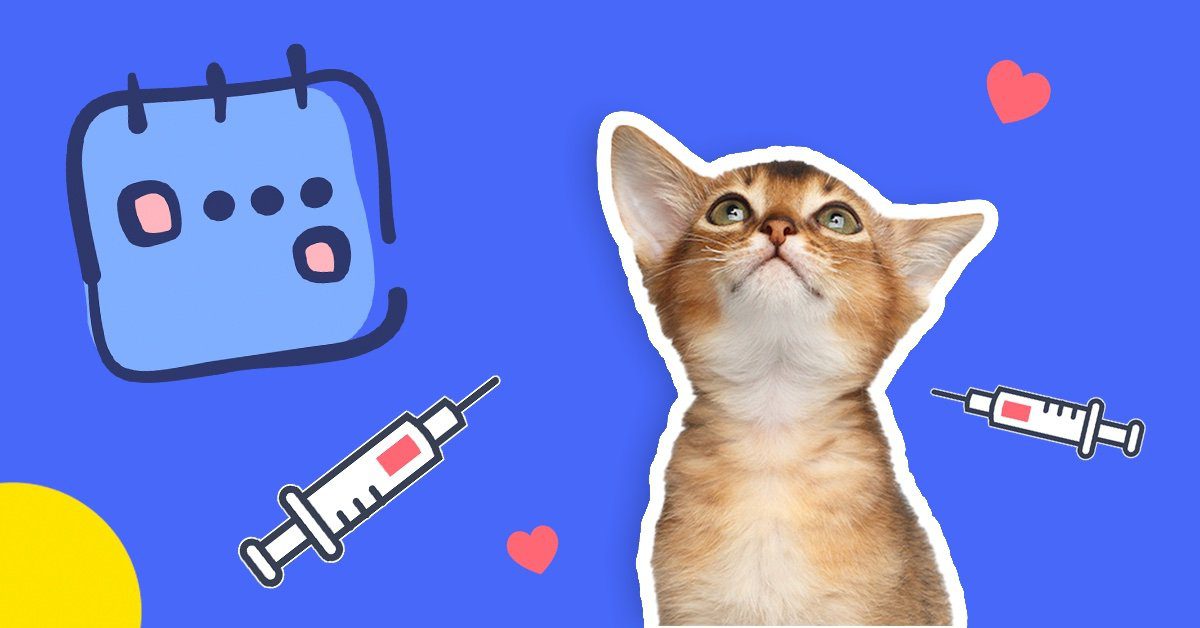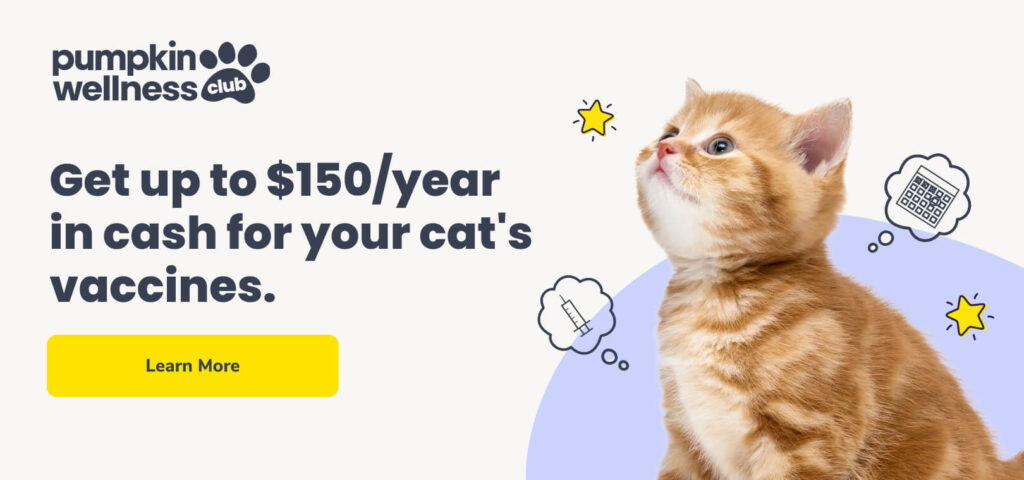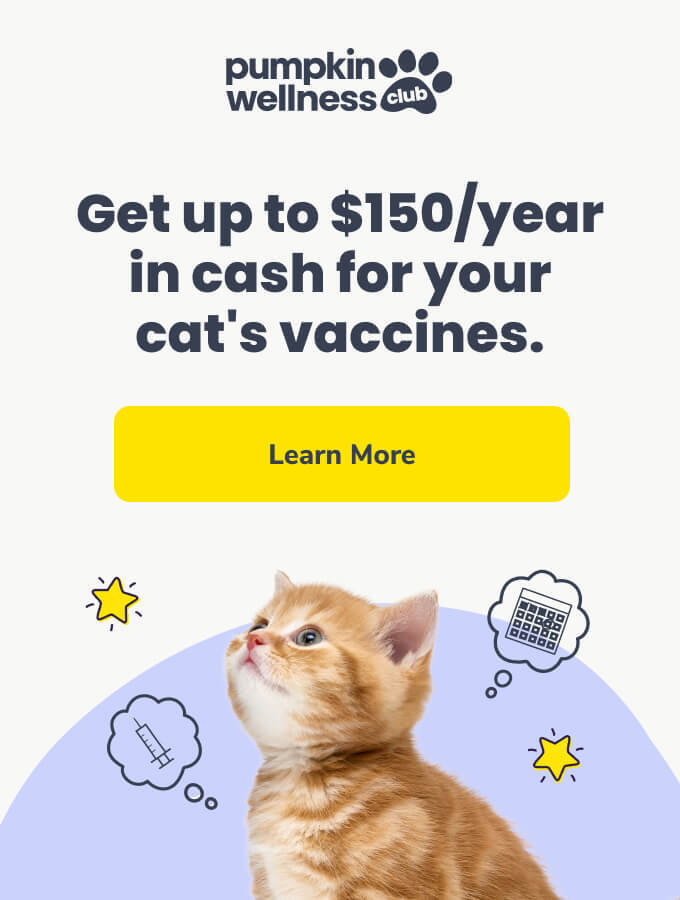Key Points
- A kitten’s vaccination schedule typically begins at 6–8 weeks of age with the FVRCP vaccine, a combination shot that protects against several common feline diseases.
- Your kitten may also need vaccinations for feline leukemia and rabies, with boosters every year to top off their protection.
- Members of the Pumpkin Wellness Club* can get paid up to $150 per year for cat and kitten vaccines — and that’s just one of many perks of joining.
You’ve built a kitten palace out of cardboard boxes, purchased a rainbow of wand toys, and cat-proofed your home for your new feline friend. What else is left on your new kitten checklist?
To protect your new kitty from common illnesses, scheduling kitten vaccines should be at the top of your list. Or, at a minimum, it should be number two on the list — right after “take tons of videos to post on social media.”
As a new cat owner, you should connect with a licensed veterinarian and schedule a visit for your kitten’s vaccinations and early examinations. Plus, your vet can answer any questions you have about feeding and caring for your new fur family member.
Pumpkin knows that kitten vaccinations are important, but they can also be pricey. Enter the Pumpkin Wellness Club, a new way to get paid for the routine preventive care your pet needs: from vaccinations to annual wellness exams and more. Members of the club get up to $150 for annual vaccines, access to a 24/7 Pet Health Helpline, and other perks like special discounts on top pet brands. All in all, cat parents can save up to $390 per year by joining the club.
Keep reading to learn more about which cat vaccines your growing kitten needs, when to schedule vaccinations and boosters, and what to expect at your first vet visit.
How do kitten vaccines work?
When kittens are born, they receive antibodies — proteins that help the immune system recognize and fight disease — from their mother’s milk. This immunity lasts for the first few weeks of a kitten’s life and then gradually declines.
Just like a tiny human, your kitten needs a little help to stay healthy after they lose that early immunity. This is where vaccines come to the rescue: Vaccines teach a kitten’s immune system to build their own antibodies against infectious diseases and help prevent future infections.
The kitten vaccination schedule should begin after the antibodies from their mother start to fade, since that natural immunity can interfere with vaccine response. However, you shouldn’t wait until those antibodies disappear completely, leaving your kitten vulnerable to disease. Getting this timing right is vital to successful immunization.
Kittens generally start their immunization schedules when they’re 6–8 weeks old, with boosters at three to four-week intervals, completing the regimen when they’re around 4 months old.
Recommended vaccines for kittens
Kitten vaccines are typically separated into two categories: core vaccines and non-core vaccines. Let’s dive into the lists for each type and which are recommended for kittens.
Core vaccines
Core vaccines are recommended for all cats and protect your kitten from some of the most common feline diseases. According to the latest guidelines for feline vaccinations from the American Animal Hospital Association (AAHA) and the American Association of Feline Practitioners (AAFP), recommended core vaccines include:
Feline herpesvirus (FHV-1)
Feline herpesvirus causes a serious and highly contagious upper respiratory infection, also known as feline viral rhinotracheitis (FVR). Kittens and older cats are more likely to be infected.
Symptoms may include:
- Red, swollen eyes (conjunctivitis)
- Sneezing
- Nasal congestion and nasal discharge
- Fever
- Lethargy
- Reduced appetite
- Swollen lymph nodes and, in some cases, ulcers around the mouth
Feline calicivirus (FCV)
Feline calicivirus is another very contagious virus that causes severe upper respiratory infections. The virus targets the lining of the mouth and lungs, and in some cases, can lead to pneumonia.
Similar to FVR, kittens and older adult cats are more likely to have serious symptoms if infected with FCV.
Feline panleukopenia (FPV)
Also known as feline distemper or feline parvovirus, this virus is highly contagious and can cause a range of symptoms — fever, lethargy, vomiting, and diarrhea, just to name a few — and is sometimes fatal.
Note: The feline calicivirus, feline viral rhinotracheitis, and feline panleukopenia vaccines are often part of a combination vaccine, called the FVRCP vaccine, that protects kittens against all three viruses.
Rabies
Rabies is usually transmitted through saliva from the bite of an infected animal, causing a fast-progressing and deadly illness. An infected animal can transmit the disease to humans through bites and is fatal without treatment. Because of this, rabies vaccines are required by law in most states.
Feline leukemia (FeLV)
The feline leukemia virus depresses the immune system of cats and leads to persistent infection. There is no treatment for this disease, and therefore, it is ultimately fatal. It is important to note that some veterinarians consider FeLV a core vaccine for kittens, while others consider it non-core or a lifestyle vaccine depending on your cat’s risk.
Pet Pro Tip: Join the Pumpkin Wellness Club to save up to $390/year on vaccinations and routine preventive care, plus access to special discounts on pet products. Learn more about membership options and how you can get cash back on starting your kitten off right.
Non-core vaccines
Your veterinarian may recommend additional vaccines depending on your cat’s lifestyle, where you live, their exposure to other cats, and existing health conditions. These are known as non-core vaccines, and while they’re not required for all cats, it’s worth asking your vet about the following shots:
Feline immunodeficiency virus (FIV)
The feline immunodeficiency virus attacks the immune system, leaving a cat vulnerable to other types of infections. This virus is spread through bite wounds from an infected cat, making outdoor cats more susceptible to transmission.
Chlamydia felis
This bacterium causes an infection called chlamydial conjunctivitis, which causes conjunctivitis and mild upper respiratory infections in cats. Young cats and kittens are particularly susceptible to the infection. The vaccine is only recommended for cats that spend a lot of time at groomers, kennels, or in multi-cat households that are known to have a problem with chlamydia.
Bordetella bronchiseptica (kennel cough)
Bordetella also causes upper respiratory infections and is most likely found in cats that are in close contact with other cats or dogs, such as in rescues, shelters, or multi-animal households. The bordetella vaccine can be given to prevent the spread of infection in these environments.
Kitten vaccine schedule
Now that you understand which vaccines your kitten may need, let’s break down what a kitten vaccination schedule might look like.

6–8 weeks:
- FVRCP combination vaccine. This vaccine can be given as early as 6 weeks of age. A total of three to four boosters are given, three to four weeks apart.
9–12 weeks:
- FVRCP booster.
- FeLV vaccine (if you choose to give this vaccine). This vaccine can be given as early as 8 weeks of age. A total of two vaccines are given, three to four weeks apart.
12–16 weeks:
- Final FVRCP booster.
- Final FeLV vaccine.
- Rabies. Kittens only need one dose, typically at 16 weeks of age.
Generally, after your kitten has completed their initial series of shots, they’ll need to receive boosters every one to three years depending on the vaccine or other health considerations.
Of course, every veterinarian will have their own policies for immunizations and disease screening, as well as other procedures that are common for kittens, such as deworming and starting heartworm prevention.
How much do kitten vaccines cost?
Bringing a new kitten into the family involves a multitude of expenses, and vaccines are just the start. The cost of vaccinating your kitten can vary based on a number of factors such as your location, your veterinarian, and the type of vaccine.
In general, you can expect the cost of a single vaccine to range anywhere from $25 to $50. That said, some veterinarians may offer multiple services for your kitten — vaccinations, an examination, and deworming, for example — packaged within a single price.
You’ll need to visit the vet for several rounds of vaccinations in your kitten’s first year of life. Those costs can add up, but the Pumpkin Wellness Club can help you pay for the routine preventive care your kitten needs to stay healthy. For as low as $14.95 per month, you can get paid cash for your growing cat’s vaccinations, bloodwork, and other eligible services kittens receive at their routine wellness visits — exam fee included. Between routine care and access to special discounts on top pet brands, members can save up to $390 per year while keeping their pets happy and healthy.
Risks of vaccines for kittens
Although cat vaccines come with some risks, they’re very minor compared to the benefits. Similar to humans, kittens who receive vaccines may experience some initial side effects, such as a low fever, decreased appetite, localized swelling, or tiredness.
These symptoms can start shortly after the vaccine and usually last only a few days. If your kitten continues to experience side effects for several days or more, contact your veterinarian.
Some kittens may experience allergic reactions to vaccines, which can cause itchiness, hives, and swelling of the face. If you see any of these symptoms after your kitty gets their shots, you’ll want to take them back to the vet immediately, and be aware of the risk with any future vaccinations.
Finally, in rare situations, cats can develop feline injection-site sarcomas, or FISS. This type of malignant cancer is thought to be caused by persistent swelling from the spot where a cat was vaccinated. It has been associated with the FeLV vaccine and, more rarely, the rabies vaccine. FISS tumors are aggressive and invade surrounding tissues, and they can require surgery and radiation for treatment.
Overall, veterinarians and feline medical organizations like the AAHA and AAFP agree that the incidence of negative side effects as a whole is low, and the benefits of core kitten vaccines far outweigh the risks.
Planning for a healthy future
The right vaccines will help your kitten stay protected against disease. This is just one of many steps you’ll take as a new cat owner to make sure that your feline friend is set up for a long, healthy life.
After your kitten has received their vaccines, talk to your veterinarian about the best path forward for your cat’s health — whether that’s choosing the right cat food, finding a great brush, or creating an enriching environment to keep your little furball from scratching up the couch. And while you’re at it, you can find more vaccination tips here!
DISCLOSURE






